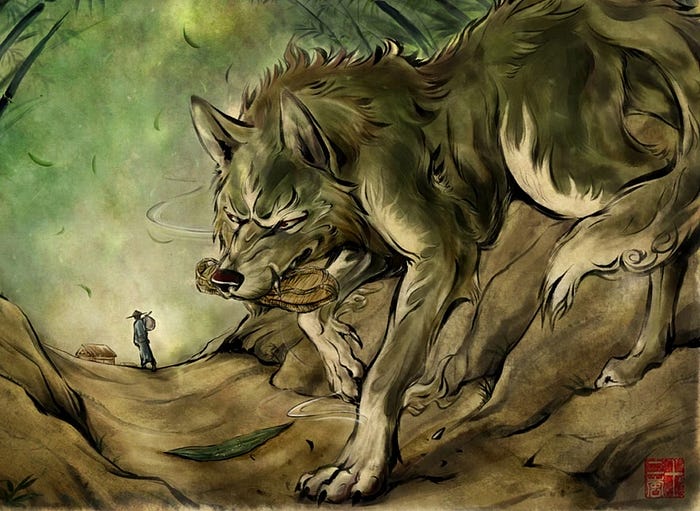Yōkai : Okuri Inu (送り犬 escorting dog)
The okuri-ōkami possesses the potential to safeguard individuals if treated with proper respect.
The formidable okuri inu (送り犬 escorting dog), a yokai reminiscent of canines or wolves, emerges under the veil of night, haunting mountain passes, forested roads, and other secluded realms. While their physical appearance bears resemblance to ordinary dogs and wolves, it is their unparalleled ferocity that sets them apart, rendering them far more perilous than their mortal counterparts.
The mysterious okuri-inu, a supernatural creature encountered along mountain paths during the nocturnal hours, weaves tales of both trepidation and potential salvation. It is said that this yokai closely trails individuals who venture upon these secluded trails, their fate entwined with the actions they take. Should a person stumble or fall, their existence teeters on the precipice of being devoured. However, if they feign a brief respite, the okuri-inu’s menacing intentions may be temporarily thwarted. Care must be taken, however, not to display overt signs of weariness, for the creature’s perception is keenly attuned.
These characteristics remain consistent across various regions, although the behavior of the okuri-inu may exhibit slight variations. In certain areas, tales circulate of the okuri-inu charging directly at unsuspecting individuals, while a fall attracts a swift onslaught from a pack of accompanying canines.
Some regions boast accounts that shed light on the aftermath of safely traversing the mountain paths. Legend suggests that upon reaching journey’s end, bidding farewell or expressing gratitude to the okuri-inu prompts its cessation of pursuit. Another belief asserts that upon returning home, one should cleanse their feet, offer thanks for a secure journey, and extend a symbolic gift to the okuri-inu. It is believed that these gestures will prompt the creature to depart peacefully.
A book from the early Shōwa period titled “Chiisagata-gun mindanshū” recounts the tale of a woman from Shioda, now Ueda, who embarked on a journey to her parents’ house to give birth while leaving her husband behind. Fate led her to experience labor pains along a mountain path, where she delivered her child amidst the encroaching darkness. To her dismay, a gathering of okuri-inu surrounded her. Fearful yet defiant, she uttered, “If you wish to devour us, then do so!” To her astonishment, instead of attacking, the okuri-inu valiantly shielded the mother and child from the lurking wolves of the mountains. Reunited with her husband, they expressed gratitude by offering the okuri-inu red rice, symbolizing auspicious occasions.
The book further classifies yama-inu from Koumi as either okuri-inu or mukae-inu, with the former known to protect individuals as exemplified by the tale from Shioda, while the latter displays aggression towards humans.
From the Kantō to Kinki regions, as well as Kōchi Prefecture, legends also speak of the okuri-ōkami, known as the “sending-off wolf.” Similar to the okuri-inu, it elicits fear as it stalks travelers along mountain roads, with rumors of its propensity to devour those who stumble.
Yet, intriguingly, the okuri-ōkami possesses the potential to safeguard individuals if treated with proper respect. According to the Honchō shokkan, pleading for one’s life without resistance may invoke the okuri-ōkami’s protection against other menacing creatures that inhabit the mountains.
The Wakan Sansai Zue suggests that the creature will refrain from harm as long as one remains unafraid and avoids resistance. However, it will seize the opportunity to consume those who succumb to fear and falter. Curiously, the scent of a burning fuse can drive away the okuri-ōkami, prompting travelers to carry one as a precautionary measure.
Moreover, engaging in conversation or casually smoking tobacco is said to foster an amicable rapport, leading the okuri-ōkami to escort individuals safely home. Offering its favorite food or a single sandal as a gesture of gratitude is believed to appease the creature, thus concluding its presence.
In certain regions such as the Izu Peninsula and Toda, tales of the okuri-itachi, a companion to the okuri-inu, emerge. This yokai, also haunting nocturnal travelers, reportedly disperses upon having a sandal hurled in its direction.
Furthermore, the notion of the okuri-ōkami, with its dual nature of gaining favor while harboring ill intent or a man persistently following a woman, has influenced the Japanese expression “okuri-ōkami.” These legends continue to captivate, their origins shrouded in mystery, with some speculating that they may be rooted in the nature and traits of the Japanese wolf, a creature that once roamed these lands.
©Emika Oka
Thank you for reading this.
Your support holds immense significance for a disabled neurodivergent.
If you’d like to show your support, you can consider buying me a coffee here. My collection of eBooks and classic titles is available here. Your kindness is greatly appreciated.
Source
送り犬(おくりいぬ) - 妖怪うぃき的妖怪図鑑 (hatenablog.com)
信頼できない守り手、送り犬 – 妖怪屋 (youkaiya.jp)
送り犬 - Wikipedia



